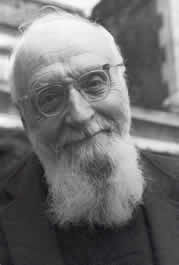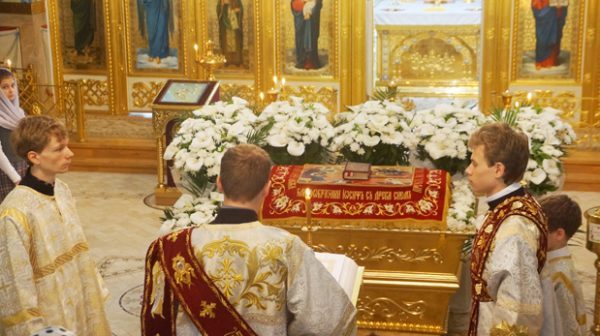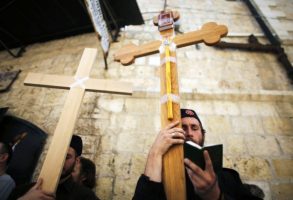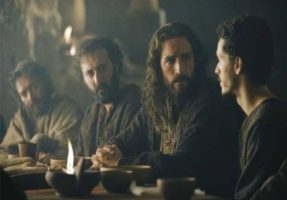On Holy Saturday the Church directs and concentrates our attention on our Lord’s tomb. In the whole liturgical year, there is no day with a more complex character than Holy Saturday, for this day shares both in the sorrow of the Passion and in the joy of the Resurrection. The celebration of Easter, which has been more and more advanced, has ended by annexing the greater part of the day of Holy Saturday. It is possible to distinguish in Holy Saturday two consecutive parts, one of which still belongs to the time of the Passion, and the other already to the time of Easter…

Archimandrite Lev Gillet
As we have indicated, Holy Saturday already ‘pierces’ into the rite of Christ’s burial which is celebrated on the Friday afternoon. But is begins properly with matins for Saturday, sung either in the evening on the Friday, or in the morning of Saturday itself. After the matins psalms and some other prayers, a ‘canon’ of nine canticles is sung. After the ninth canticle, a procession forms in the middle of the church, near the tomb which is covered… by the epitaphion. Then the “encomia”, which are a series of stanzas divided into three parts separated by litanies, as sung. Here are some of them:
‘Thou who didst establish the measure of the earth, Jesus, King of the Universe, today art held by a narrow grave… Jesus my Christ, King of all creation, what dost Thou seek in entering hell? Dost thou wish to set free the race of mortal men? The Lord of Creation lies beneath our eyes; He is dead, He who empties the tombs is placed in a new grave… He who amongst all mortals is beautiful is seen as dead; He who made the natural universe beautiful… All creation, O Word is overwhelmed by Thy Passion, for with Thee all creatures suffer… Like the grain of wheat buried in the womb of the earth, Thou hast brought forth a heavy ear in raising mortal men to life…
Thy side was opened, Thou, who didst take a rib from Adam to fashion Eve… Stretched on the wood, O Jesus, Thou dost gather all men, from the wound in Thy side whence flows life, Thou dost pour forgiveness to all. I adore Thy Passion, I hymn Thy burial… O my joy… how shall I bear the three days of Thy burial? My entrails suffer as do those of mothers… The earth trembles to see Thee resting in its bosom… With the myrrh-bearing women, let us hasten to anoint, as one would a corpse, Him who lives…’
The epistle is followed by the last of the twelve gospels read on Holy Thursday (Matth. 27, 62-66); the priests persuade Pilate to have Jesus’ tomb sealed and guarded. Matins comes to an end with a litany and the normal prayers of dismissal.
Here that part of Holy Saturday which belongs to the Passion of Christ ends. The rest of this day belongs to the time of Easter.
…Let us stop for a while near the tomb of our Lord. Two passages from Holy Scripture will help us to take in the message of Holy Saturday. The first, a text from the gospel according to Saint Luke:
‘And the women also, which came with him from Galilee, followed after, and beheld the sepulchre, and how his body was laid. And they returned, and prepared spices and ointments; and rested the Sabbath day according to the commandment’.
In the life of every disciple of Jesus, there come times when the Master seems to withdraw himself and to remain absent- as if in some way he is buried. These Galilean women show us what our attitude should be at such moments. They have observed the grave; they know where Jesus is.
And we, too, must not doubt that Jesus is there, even if he does not seem to answer, even if he has become invisible: we must keep our eyes fixed, if not on him, at least in his direction. The women are not idle, they do not say: ‘Now nothing can be done’. They prepare spices with which to anoint Jesus’s body. They continue to honour him, although he has withdrawn from his human body. In the same way, during the times when Jesus veils himself and is silent, let us not cease to keep him at the centre of our adoration. Let us prepare spices- the spices of our affections and works- to offer from now on to the Friend whom we do not see, and also to offer to him when once again we feel his presence- for we know he will come back to us.
But there is no agitation in the women’s preparations; they keep the Sabbath, they rest. While Jesus is in the tomb is a time of waiting and of silence: a time for secret life, hidden and contemplative, near him, with him. Holy Saturday is the feast of those mystics whom the world is unaware of, and who wish to be known only by Jesus. The peace of Holy Saturday is entirely oriented towards the great event of Sunday morning, towards the power and the joy of the Resurrection.
But we have to safeguard this peace ‘which waits’: Oh! That invasion of external preparations for Easter, which prevents so many Orthodox from keeping this feast as a retreat and in silence. On this day, let us read again the words of Paul to the Romans:
‘We are buried with him by baptism unto death… Likewise reckon ye also yourselves to be dead indeed unto sin, but alive unto God through Jesus Christ our Lord’.
If I were able to persuade myself sufficiently that I was dead with Jesus, buried with Jesus, my spiritual life would become so much simpler and easier.
To every temptation, to everything that distracted me from the one thing necessary, I should answer only: ‘What is the point? I am dead. I am in the tomb of my Master’. Instead of arguing and fighting with life, I should place myself straight away on the other side, outside life (naturally this means the desires of worldly life), and then, dead to the world and to sin, I should be more than ever alive ‘in God’. One could even say that in this there is a spiritual tactic, a singularly efficacious tactic, open to those in all walks of life, an ‘entombment’ with our Lord. We have sung today: ‘I praise Thy entombment’. We might now add: ‘Grant that I may be entombed with Thee”.
Source: L’An de Grâce du Seigneur, translated from the French by Deborah Cowen.
















